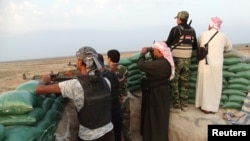U.S. Secretary of State John Kerry met Monday with ambassadors from countries backing the international coalition against Islamic State militants in Iraq and Syria.
State Department Spokeswoman Jen Psaki said Secretary Kerry met with about 60 Washington-based ambassadors from countries involved in the fight against the militants because “diplomacy is an important part” of the coalition.
"The session is an opportunity for coalition partners to reaffirm shared efforts in the coalition, discuss ways in which we can integrate our contributions to coalition efforts, and review ways to accelerate and increase our joint operations,” she said.
The meeting to counter Islamic State - also known as ISIS or ISIL - was hosted by Special Presidential Envoy General John Allen and Deputy Special Presidential Envoy Brett McGurk, both of whom have worked to coordinate its efforts in meetings last month in Britain, France, Saudi Arabia, Kuwait, Bahrain, Qatar, the United Arab Emirates, and Oman.
In addition to airstrikes against Islamic State targets, coalition members are working to train Iraqi security forces and Syrian rebels, restrict IS financing, cut-off its supply of foreign fighters, and undermine its ideological appeal.
American University professor Akbar Ahmed believes much of the work to discredit Islamic State will focus on its secretive leader, Abu Bakr al-Baghdadi.
"Who is this mysterious khalif who has emerged almost from nowhere, almost, I would say, ridiculous in his pronouncements, in his bearing? And suddenly he is talking as if the entire Muslim world - one-and-a-half-billion people - elected him and must now follow his dictate, his directives," Ahmed said.
Kurdish forces in Iraq have advanced against the Islamic State and are continuing to battle for control of the Syrian town of Kobani.
But there has been less progress for Iraqi government troops and reports of losses by Syrian rebels, calling into question the coalition goal of fighting the Islamic State without putting coalition forces on the ground to do so.
Psaki said reports of the group executing more civilians in Iraq’s Anbar province show the urgency of coalition efforts.
“This proves once again that ISIL does not represent anything but its warped ideology, and provides more evidence, if any were needed, why our coalition partners, including Iraqis from every background, must work together to defeat these terrorists,” she said.
Center for a New American Security analyst Nora Bensahel said the more territory ISIS tries to hold, the more vulnerable it is to popular unrest.
“The problem for ISIS now is that they have to govern. They have to govern in open space where people can see what they are doing. They are incredibly brutal and coercive in doing so," Bensahel said.
"What we saw in the mid-2000’s in the war is the Sunni populations did not like living under al-Qaida in Iraq’s brand of extremism. And the Islamic State’s brand is even more extremist than that.”
Secretary Kerry’s talks Monday with ambassadors from coalition countries follows President Obama’s meeting last month with coalition defense chiefs at which he said this will be a long-term campaign with periods of progress and setbacks.











